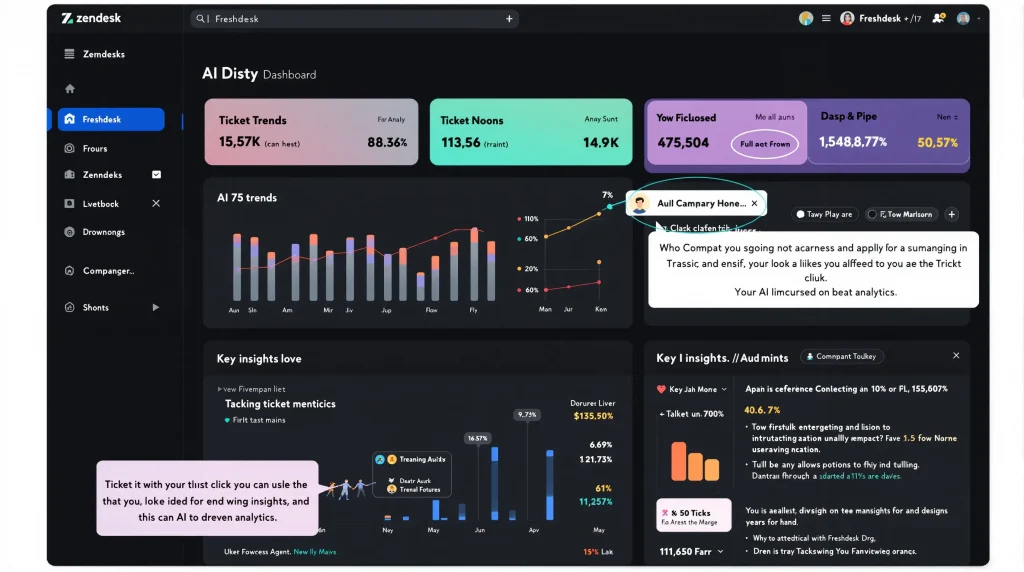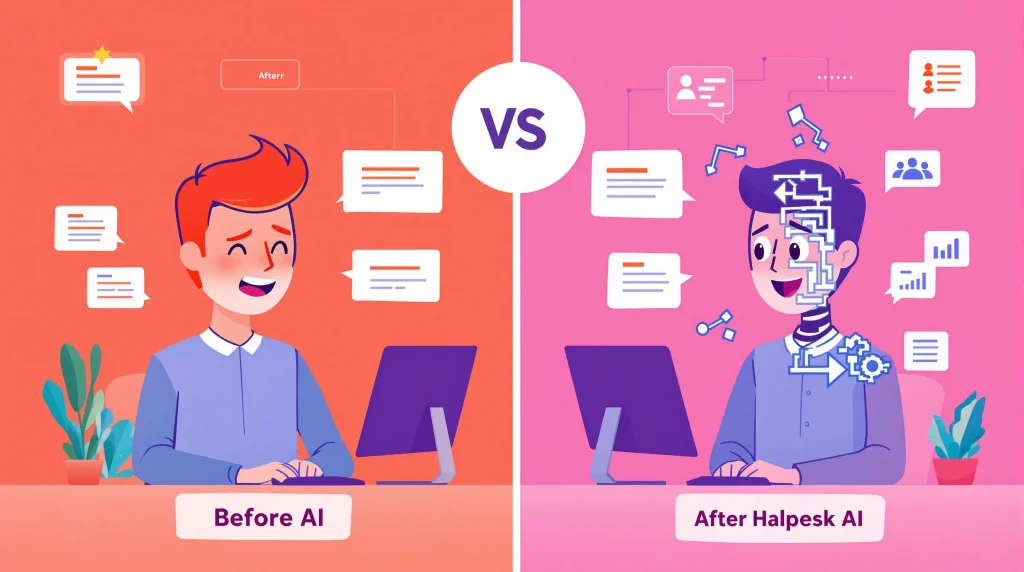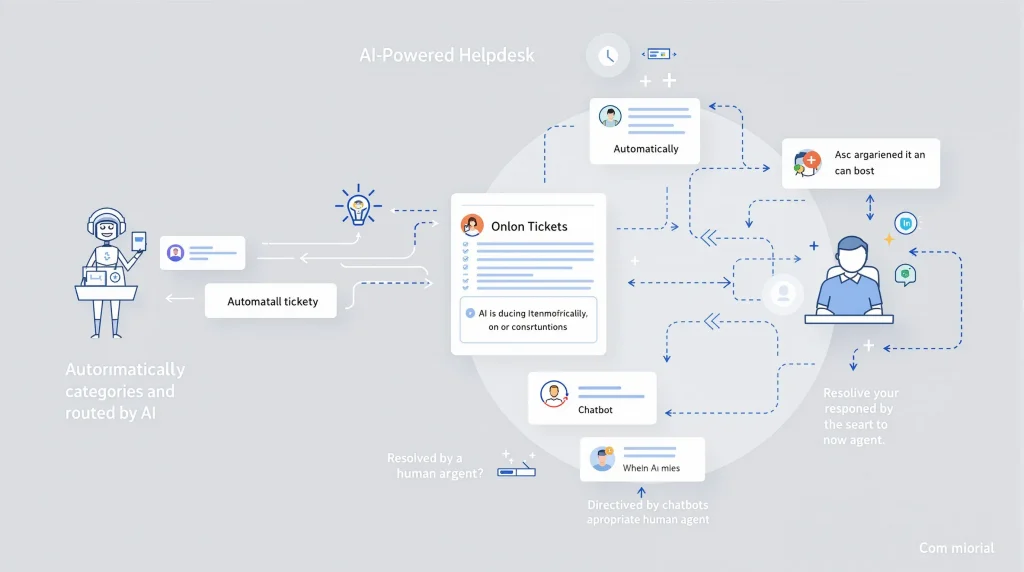The Zendesk AI Revolution: Complete Guide to AI Helpdesk Automation
Estimated Reading Time: 10 minutes
Key Takeaways
- Zendesk AI integrations can reduce ticket resolution times by up to 40%
- AI helpdesk automation frees up support agents to handle complex customer issues
- Machine learning algorithms improve over time, continuously enhancing customer service quality
- Implementing AI doesn’t require technical expertise thanks to Zendesk’s user-friendly interface
- ROI on Zendesk AI investments typically appears within 3-6 months of implementation
Table of Contents
- Understanding Zendesk AI Capabilities
- Key Benefits of AI Helpdesk Automation
- Implementing AI in Your Zendesk Workflow
- Measuring Success: Metrics and KPIs
- Case Studies: Real-World Zendesk AI Transformations
- Common Challenges and Solutions
- Future of Zendesk AI and Customer Support
Understanding Zendesk AI Capabilities
Zendesk’s AI-powered customer service platform represents a paradigm shift in how businesses handle customer inquiries. Unlike traditional helpdesk systems that rely solely on human agents, Zendesk AI incorporates machine learning algorithms that can analyze, categorize, and even respond to customer queries automatically.
The platform’s AI capabilities extend across multiple channels, including email, chat, social media, and phone support. This omnichannel approach ensures consistent customer experiences regardless of how customers choose to reach out. The system’s natural language processing (NLP) technology enables it to understand customer intent, sentiment, and urgency, allowing for more appropriate and timely responses.

“The introduction of AI to our Zendesk system was like adding a team of tireless support agents who never need breaks and continuously improve their knowledge.”
— Sarah Johnson, Customer Experience Director at TechSolutions Inc.
Core Zendesk AI features include:
- Answer Bot: Provides instant responses to common customer questions using your knowledge base
- Content Cues: Identifies gaps in your help center content based on customer searches and inquiries
- Intelligent Triage: Automatically categorizes and routes tickets to the appropriate teams
- Sentiment Analysis: Detects customer emotion to identify urgent or sensitive issues
- Predictive Analysis: Forecasts ticket volumes and customer satisfaction trends
Key Benefits of AI Helpdesk Automation
Implementing AI automation in your Zendesk helpdesk delivers multiple advantages that directly impact both operational efficiency and customer satisfaction:
Reduced Response Times
One of the most immediate benefits of Zendesk AI integration is dramatically faster response times. AI-powered systems can provide instant acknowledgments and solutions for common queries, eliminating the wait times associated with human agent availability. For businesses operating globally, this means true 24/7 support capability without the cost of round-the-clock staffing.
Increased Agent Productivity
By automating responses to repetitive queries, AI frees up human agents to focus on complex issues that truly require human empathy and problem-solving skills. This not only improves efficiency but also enhances job satisfaction among support teams who can engage in more meaningful work rather than answering the same basic questions repeatedly.

Consistent Customer Experiences
AI systems deliver remarkably consistent responses across all customer interactions. Unlike human agents who may vary in knowledge, mood, or communication style, AI provides uniform information and tone, ensuring brand consistency. This standardization is particularly valuable for companies with strict compliance requirements or those operating in regulated industries.
Scalability During Peak Periods
Seasonal spikes in support volume no longer require frantic temporary hiring. Zendesk AI can handle virtually unlimited simultaneous customer inquiries, maintaining service quality during high-demand periods like holiday seasons, product launches, or service disruptions. This elasticity ensures customers receive timely support regardless of current demand levels.
Data-Driven Insights
The AI analytics capabilities within Zendesk provide unprecedented insights into customer behavior, common issues, and support trends. These data points help businesses identify product improvements, refine knowledge base content, and optimize the overall customer experience based on actual interaction patterns rather than assumptions.
Implementing AI in Your Zendesk Workflow
Successfully integrating AI into your Zendesk environment requires thoughtful planning and execution. Here’s a practical roadmap for implementation:
Assessment and Planning
Begin by analyzing your current support workflow and identifying areas where AI can make the most significant impact. Review your ticket data to determine common inquiries, peak volume periods, and current resolution times. This baseline information will help you set realistic goals for your AI implementation and measure success later.
Define clear objectives for your AI integration, such as:
- Reducing first response time by X%
- Automating responses to Y% of common inquiries
- Improving CSAT scores by Z points
- Decreasing cost per ticket resolution

Knowledge Base Optimization
The effectiveness of Zendesk AI depends significantly on the quality of your knowledge base. Before implementation, audit your help center content for comprehensiveness, clarity, and accuracy. Organize articles with clear hierarchies and relevant tags to help the AI system locate appropriate responses. Consider creating dedicated content specifically designed for AI retrieval, focusing on concise, direct answers to common questions.
Phased Rollout Approach
Rather than implementing all AI capabilities simultaneously, consider a gradual approach:
- Phase 1: Deploy Answer Bot for ticket deflection and self-service
- Phase 2: Implement intelligent ticket routing and categorization
- Phase 3: Add sentiment analysis and priority detection
- Phase 4: Enable predictive analytics and proactive support features
This methodical implementation allows your team to adapt to changes gradually while providing opportunities to refine each component before adding complexity.
Agent Training and Adoption
For successful AI integration, support agent buy-in is crucial. Address potential concerns about job security by emphasizing how AI handles routine tasks so agents can focus on more rewarding complex issues. Provide comprehensive training on how to:
- Review and improve AI-suggested responses
- Override AI decisions when necessary
- Contribute to knowledge base improvements
- Interpret AI-generated insights
Consider appointing “AI champions” within your support team who can provide peer guidance and collect feedback for continuous improvement.
Measuring Success: Metrics and KPIs
To validate the impact of your Zendesk AI implementation, establish clear metrics for evaluation. The following key performance indicators provide comprehensive insight into AI effectiveness:
Operational Efficiency Metrics
These metrics focus on quantifying improvements in support operations:
- Ticket Volume Per Agent: Track changes in the number of tickets handled by each agent before and after AI implementation
- Resolution Time: Measure both first response time and total resolution time across ticket categories
- Self-Service Ratio: Calculate the proportion of customer issues resolved through AI-powered self-service versus those requiring human intervention
- Ticket Deflection Rate: Identify the percentage of potential tickets prevented by AI interventions

Customer Experience Metrics
These metrics evaluate the impact on customer satisfaction:
- Customer Satisfaction (CSAT) Scores: Compare satisfaction ratings for AI-handled versus agent-handled interactions
- Net Promoter Score (NPS): Monitor changes in overall NPS following AI implementation
- Customer Effort Score (CES): Assess whether AI is making issue resolution easier for customers
- AI Accuracy Rate: Track how often AI provides correct information or appropriate responses
Financial Impact Metrics
Quantify the business value of your AI investment:
- Cost Per Resolution: Calculate average support costs before and after AI implementation
- ROI Timeline: Measure how quickly AI investments are recouped through operational savings
- Revenue Impact: Assess whether improved support experiences correlate with increased sales or reduced churn
- Staffing Efficiency: Evaluate changes in support headcount requirements relative to business growth
“After implementing Zendesk AI, we saw a 35% reduction in ticket handling time while simultaneously increasing our CSAT scores by 12 points. The system paid for itself within the first quarter.”
— Michael Chen, VP of Customer Support at CloudRetail
Case Studies: Real-World Zendesk AI Transformations
E-Commerce Platform: Handling Seasonal Spikes
An online retailer with 5 million monthly customers previously struggled with support backlogs during holiday seasons, leading to poor reviews and lost sales. After implementing Zendesk AI, they achieved:
- 42% reduction in average response time during Black Friday/Cyber Monday
- 65% of order status and return queries handled entirely by AI
- Elimination of seasonal hiring needs, saving approximately $120,000 annually
- Consistent customer satisfaction scores year-round, even during peak periods
SaaS Company: Scaling Global Support
A fast-growing software company needed to support customers across multiple time zones without massive expansion of their support team. Their Zendesk AI implementation resulted in:
- 24/7 support capability with just two shifts of human agents
- Support for 12 languages through AI translation and response
- 38% increase in first-contact resolution rate
- Ability to scale from 10,000 to 50,000 customers with only a 15% increase in support headcount
Financial Services Firm: Ensuring Compliance
A financial institution implemented Zendesk AI to improve customer support while maintaining strict regulatory compliance. Their results included:
- 100% consistent application of compliance language in customer communications
- Automatic flagging of potentially sensitive inquiries for specialized handling
- 47% reduction in compliance-related escalations
- Comprehensive documentation of all AI-customer interactions for audit purposes
Common Challenges and Solutions
While Zendesk AI offers transformative potential, implementation isn’t without obstacles. Here are common challenges and practical solutions:
Knowledge Base Limitations
Challenge: Insufficient or outdated knowledge base content limits AI effectiveness.
Solution: Conduct a comprehensive content audit before implementation. Use Content Cues to identify information gaps based on customer searches. Establish a regular review cycle to keep content current, and consider appointing a dedicated knowledge manager responsible for maintaining AI-friendly documentation.
Handling Complex Inquiries
Challenge: AI struggles with nuanced or complex customer issues.
Solution: Define clear boundaries for AI handling versus human escalation. Configure your system to recognize complexity signals like multiple back-and-forth exchanges or specific technical terminology. Implement seamless handoff protocols so customers experience a smooth transition when their issue requires human intervention.
Agent Resistance
Challenge: Support team members fear replacement or resist workflow changes.
Solution: Focus on how AI handles repetitive tasks while creating opportunities for career advancement through more complex problem-solving. Create incentive structures that reward collaboration with AI systems. Involve agents in the implementation process to build ownership and gather valuable front-line input.
Maintaining Human Touch
Challenge: Customer interactions feel robotic or impersonal.
Solution: Customize AI responses to reflect your brand voice and values. Include personalization elements that reference customer history or specific details from their inquiry. Create transparent experiences where customers know when they’re interacting with AI versus humans, and provide easy options to reach human agents when preferred.
Data Privacy Concerns
Challenge: Customers or regulations restrict AI processing of sensitive information.
Solution: Configure your Zendesk AI implementation to recognize and exclude sensitive data from automated processing. Create specific workflows for privacy-sensitive inquiries that route directly to human agents. Maintain transparent communication about how AI uses customer data and obtain appropriate consent where required.
Future of Zendesk AI and Customer Support
The landscape of AI-powered customer support continues to evolve rapidly. Here are key trends to watch as you plan your long-term Zendesk AI strategy:
Predictive Support Models
Next-generation Zendesk AI will increasingly shift from reactive to proactive support paradigms. By analyzing usage patterns, system performance, and historical data, AI will identify and address potential issues before customers even experience them. This predictive capability will transform customer expectations from “please solve my problem” to “thank you for preventing my problem.”
Emotional Intelligence Enhancements
While current sentiment analysis can detect basic emotions, future AI systems will develop more nuanced emotional intelligence. This includes understanding cultural contexts, detecting subtle frustration signals, and adjusting communication style to match customer personality types. These advancements will significantly narrow the gap between AI and human support experiences.
Augmented Agent Capabilities
Rather than replacing human agents, evolving AI will increasingly focus on augmenting their capabilities through real-time assistance. Imagine systems that listen to customer calls and instantly provide agents with relevant information, suggest resolution paths, or even detect compliance risks—all while the conversation is happening. This human-AI collaboration model represents the optimal balance of efficiency and personalization.
Voice and Visual Support Integration
As natural language processing continues advancing, Zendesk AI will expand beyond text to encompass sophisticated voice and visual support options. This includes AI-powered video troubleshooting where customers can show problems through their camera, and the system can provide visual guidance overlaid on their screen. Voice interactions will become more conversational and less script-bound.
Hyper-Personalization
Future AI systems will deliver increasingly personalized support experiences by integrating broader customer data. By understanding purchase history, browsing behavior, support preferences, and even social media sentiment, AI will tailor interactions to individual customer profiles. This level of personalization will make automated interactions feel remarkably human-like in their relevance and context-awareness.
“The businesses that thrive in the next decade won’t be those that simply implement AI, but those that continuously evolve their AI capabilities to match rising customer expectations for immediacy, personalization, and effortless experiences.”
— Dr. Emily Rodriguez, Customer Experience Futurist
Need expert help with AI customer support for your business? Contact us for tailored solutions. You can also test our AI customer robot developed for Shopify here: Test our AI Chatbot.
Frequently Asked Questions
How much technical expertise is required to implement Zendesk AI?
Zendesk AI is designed with accessibility in mind, requiring minimal technical expertise for basic implementation. The platform offers a user-friendly interface with pre-built AI capabilities that can be activated through simple toggles and configurations. For standard features like Answer Bot and basic ticket routing, most businesses can implement these without dedicated developers. More advanced customizations, such as creating specialized AI workflows or integrating with proprietary systems, may require some technical resources. However, Zendesk provides extensive documentation, guided setup wizards, and professional services if needed.
What is a realistic timeline for seeing ROI from Zendesk AI implementation?
Most businesses see initial return on investment from Zendesk AI within 3-6 months of proper implementation. The timeline varies based on several factors, including your ticket volume, complexity of support issues, quality of knowledge base, and implementation approach. Organizations with high volumes of repetitive inquiries typically see faster ROI, sometimes within the first billing cycle, as the immediate reduction in ticket handling time delivers clear cost savings. Companies with more complex support environments may take longer to realize full benefits, but typically see incremental improvements throughout the implementation process. Key to accelerating ROI is focusing initial AI efforts on high-volume, straightforward inquiries while building a comprehensive measurement framework to track progress.
How does Zendesk AI handle multiple languages for global support?
Zendesk AI supports multilingual customer service through several integrated capabilities. The system incorporates neural machine translation that can detect the language of incoming customer inquiries and translate them in real-time. This allows the AI to process questions in one language, search for answers in your knowledge base, and then translate responses back to the customer’s preferred language. For optimal performance, you can maintain language-specific knowledge bases and train the AI with multilingual datasets. The platform supports over 40 languages with varying degrees of capability, with major global languages having the most advanced support. Language detection happens automatically, and customers can also manually select their preferred language for interactions.
Can Zendesk AI integrate with our existing CRM and business systems?
Yes, Zendesk AI is designed for seamless integration with a wide range of CRM platforms and business systems. The platform offers pre-built integrations with popular CRM solutions like Salesforce, HubSpot, Microsoft Dynamics, and of course, Zendesk’s own CRM. These integrations allow the AI to access customer history, purchase data, and account information to provide more contextual support. Beyond CRM, Zendesk AI can connect with e-commerce platforms, ERP systems, inventory management tools, and custom databases through its API framework. This connectivity enables powerful workflows such as AI-triggered order status lookups, account-specific information retrieval, and personalized support based on customer segments or purchase history. For organizations with unique requirements, Zendesk’s App Framework allows for custom integration development.
How does Zendesk ensure AI responses are accurate and appropriate?
Zendesk employs multiple mechanisms to ensure AI response accuracy and appropriateness. The system primarily draws answers from your curated knowledge base rather than generating information independently, which maintains control over content accuracy. Confidence thresholds can be configured so the AI only provides answers when it has high certainty about their relevance. For responses with lower confidence scores, the system can escalate to human agents. Zendesk’s machine learning continuously improves through feedback loops—both explicit feedback from agents who review suggested responses and implicit feedback based on customer reactions. The platform also includes content moderation capabilities that can identify potentially inappropriate language and prevent its use in responses. Organizations can implement approval workflows for sensitive topics, where AI suggestions require human verification before being sent to customers.

0 Comments